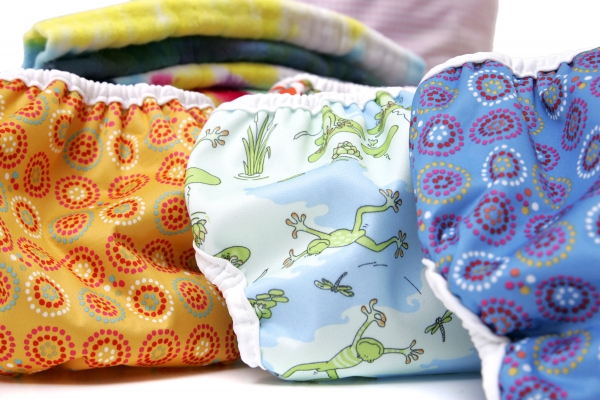How To: Guide to Cloth Diapering

Many parents are turning to cloth diapers because of the numerous advantages they provide. Aside from the obvious economic and environmental benefits, cloth diapers are also healthier for babies than disposable diapers, which can contain toxic chemicals.
Cloth diapering is a learned skill, however, and there are a few tips that every first-time cloth diapering family should be aware of. Follow these helpful tips.
1. Parents should be prepared with the essential materials before the baby arrives.
The basic structure of a cloth diaper is an absorbent fabric, which is placed directly against the baby's skin, and a waterproof fabric, or diaper cover, which goes on the outside of the diaper to prevent leaks. Purchasing 12 to 24 quality pre-fold or fitted cloth diapers and two to four waterproof covers from a baby supply store is sufficient for a newborn baby.
As the baby grows, you will have preferences for certain styles, materials, and brands so don't buy too many garments at the beginning.
Newborn babies usually need about 12 diaper changes a day, so beginning with a one- or two-day supply will allow you the time to decide what type is best for your baby.
2. Be aware of the different styles available.
Pre-folds, the most popular style of cloth diapers, are rectangular-shaped cloth fabric pieces which are folded around the baby's bottom and pinned or otherwise fastened to keep them in place.
Fitted diapers, a newer innovation on the market, are cloth pieces which are shaped to fit the baby's underside. These fitted styles usually come with snap, or hook and loop fasteners to keep the diaper in place. Many parents prefer fitted ones to pre-folds because they require less folding and pinning and come in a variety of sizes, ranging from newborn to three years of age.
All-in-one styles are also available, although they can be more expensive than pre-fold and fitted types. These pre-shaped garments are designed with both absorbent and waterproof layers attached to one another, so there is no need to purchase separate pieces.
*Another tip for beginners is to purchase one or two types of each style, pre-fold, fitted and all-in-one. There is no reason to stay with only one type, although some parents will find they have a strong preference for one type, while another parent "even one in the same household" may like to use a different design. Trying out all styles is a good way to be certain about which types to purchase and which may not be worth the money.
3. Information on the disposal of waste & the washing of the garments.
This is the major deciding factor for many parents when it comes to using cloth diapers. Most parents don't want to deal with dumping and washing the diapers. This is the easiest and cleanest way to do it in a quick way.
- Remove dirty diaper from the baby.
- Dump any solid waste in the toilet.
- Rinse garment in warm water
- Put it in a waterproof laundry basket (Or in a waterproof bag, if you are out and about).
- Wash diapers in the washing machine, with detergent, on the hot water setting.
- When the load is finished, rinse the diapers once again to remove any detergent residue which can irritate a baby's skin.
- Hang to dry or toss them in the dryer.
Check out some of our reviewed Cloth Diapers Here! OR make your own cloth diapers with this awesome free pattern!












